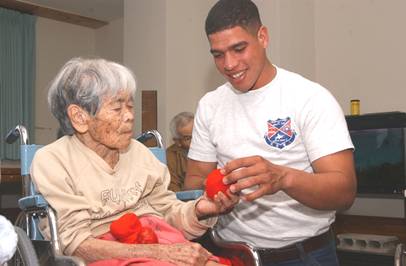|
|
Long-Term Care: A Success Story
Encouraging News for the Elderly and Their Families
Vivian Leong and Peter C. Coyte, Tronto Star
Canada
August 26, 2004

When the First Ministers meet on Sept. 13, health reform will be the main item on the agenda and debate will revolve around the urgent need to: reduce surgical waiting times; improve access to primary health care; and to institute a national pharma-care program.
Missing from this list of federal priorities is the important objective to maintain and improve long-term care services.
Over the past year, there has been a notable increase in the amount of negative publicity regarding nursing homes and care received by elderly Canadians. Stories of abuse, neglect and incompetence have resonated in the minds of families, afraid of what might occur behind the closed doors of their parents' or grandparents' residences. As such, now is not the time for politicians to forget about the health and social care needs of these older Canadians.
Luckily, the news is not all bad. A recent analysis of demographic data from Statistics Canada and a review of the number of nursing home beds have shown that 9.5 per cent of nursing home residents in Toronto are of Chinese descent, with 75 per cent of these residents living in culturally sensitive environments.
In these facilities, residents may enjoy traditional meals, speak in their first language and participate in cultural activities. For instance, residents of the Yee Hong Foundation are cared for by Chinese long-term care workers, they participate in traditional Chinese activities such as mah jong and Chinese opera, and they are given the opportunity to celebrate their traditions at Chinese New Year and during the Harvest Moon Festival.
This is a significant finding as 7.3 per cent of Torontonians older than 75 years of age are Chinese. More importantly, in the next three decades, as baby boomers enter old age, the proportion of elderly Chinese Torontonians will increase, but will not exceed the percentage of nursing home beds currently occupied by these residents.
What does this mean for the rest of society? These findings suggest that access to nursing home beds appears to be uniformly distributed in society; that this distribution is in line with the underlying needs of our local communities; and that there is equality in access for many Torontonians. Canadians have vigorously defended these values through their support of the Canada Health Act.
In Toronto, 49 per cent of the population is foreign-born, 47 per cent declare a first language other than English or French, and 43 per cent are visible minorities. These separate communities each face unique challenges when accessing health care and their experiences may represent an important marker for the rest of society. Our findings suggest that Toronto-area nursing homes have upheld the principle of equality in access. This is welcome news that deserves celebration.
Increasingly, nursing homes are evolving to match the needs of their residents with those of the wider community. There are many culturally sensitive nursing homes for different minorities. Immigrants, who fear cultural and/or verbal isolation from their elderly loved ones, compounded with the alarm caused by recent headlines, have reason to feel renewed confidence in our nursing homes.
Nevertheless, our nursing homes may not be ideal for everyone. Further studies have yet to indicate whether the proportion of less prominent minorities is appropriately represented and supported in nursing homes.
It may be the case that the abundance of homes that cater to particular cultural preferences only represents those communities that have lobbied as a united voice. Thus, if smaller communities want their voices and concerns to be heard, they will have to take a cue from these other communities, such as the Chinese, Greek, Italian, and Portuguese communities.
As our government leaders look for ways to improve health care, we suggest it may be useful for the Ministry of Health to change its designation for language and religious sensitivities to those that encompass defined ethnic minorities in order to enhance the provision of culturally sensitive health and social care.
Recognizing the importance of providing care in one's first language and addressing religious concerns is insufficient.
All facilities should understand the cultures of their residents and provide appropriate activities, food, and services to maintain and improve the quality their services.
In July, the McGuinty government announced $406 million in new funding to long-term care homes that will increase to $531 million annually.
In light of this renewed commitment to invest in long-term care, it would seem that now is the time to act, to make our voices heard and to ensure that all levels of government use our tax dollars wisely to provide the type of care that will enhance the lives of those in need.
|
|




